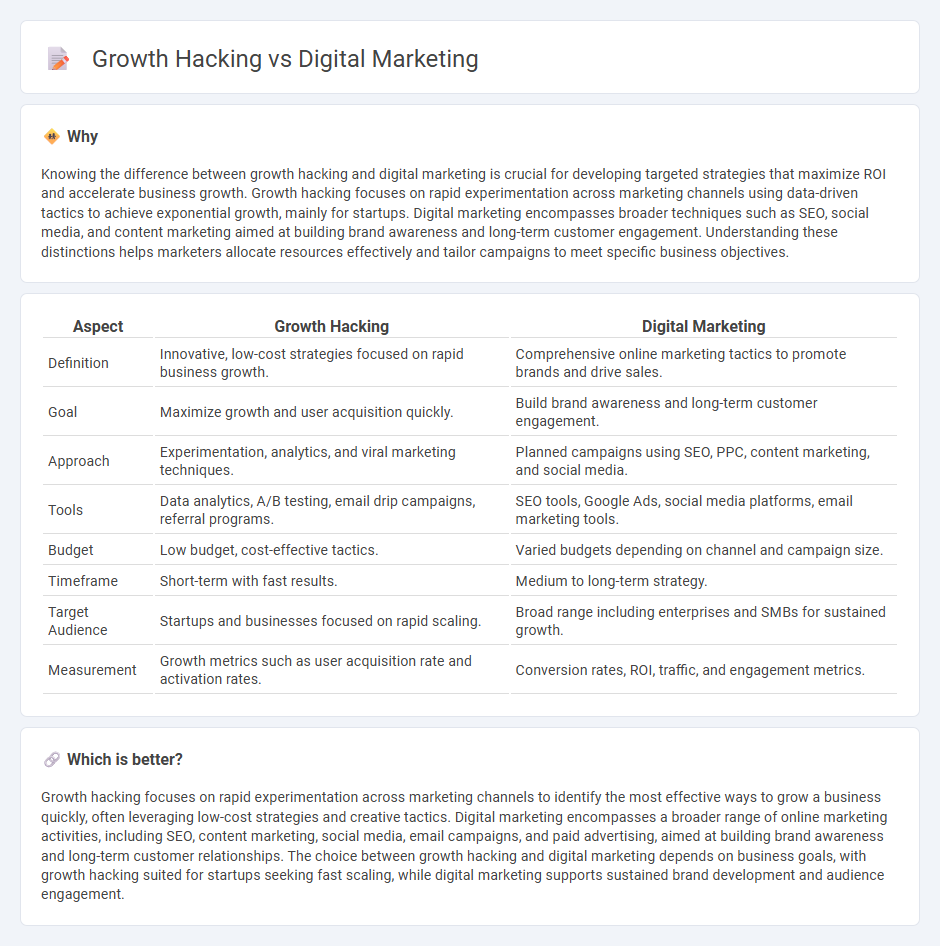
Growth hacking focuses on rapid experimentation across marketing channels and product development to identify the most effective, efficient ways to grow a business, often relying on innovative, low-cost strategies. Digital marketing encompasses a broader range of online marketing tactics, including SEO, content marketing, social media, email campaigns, and paid advertising, aiming to build brand awareness and drive customer engagement over time. Explore the differences and benefits of growth hacking versus digital marketing to optimize your business strategy.
Why it is important
Knowing the difference between growth hacking and digital marketing is crucial for developing targeted strategies that maximize ROI and accelerate business growth. Growth hacking focuses on rapid experimentation across marketing channels using data-driven tactics to achieve exponential growth, mainly for startups. Digital marketing encompasses broader techniques such as SEO, social media, and content marketing aimed at building brand awareness and long-term customer engagement. Understanding these distinctions helps marketers allocate resources effectively and tailor campaigns to meet specific business objectives.
Comparison Table
| Aspect | Growth Hacking | Digital Marketing |
|---|---|---|
| Definition | Innovative, low-cost strategies focused on rapid business growth. | Comprehensive online marketing tactics to promote brands and drive sales. |
| Goal | Maximize growth and user acquisition quickly. | Build brand awareness and long-term customer engagement. |
| Approach | Experimentation, analytics, and viral marketing techniques. | Planned campaigns using SEO, PPC, content marketing, and social media. |
| Tools | Data analytics, A/B testing, email drip campaigns, referral programs. | SEO tools, Google Ads, social media platforms, email marketing tools. |
| Budget | Low budget, cost-effective tactics. | Varied budgets depending on channel and campaign size. |
| Timeframe | Short-term with fast results. | Medium to long-term strategy. |
| Target Audience | Startups and businesses focused on rapid scaling. | Broad range including enterprises and SMBs for sustained growth. |
| Measurement | Growth metrics such as user acquisition rate and activation rates. | Conversion rates, ROI, traffic, and engagement metrics. |
Which is better?
Growth hacking focuses on rapid experimentation across marketing channels to identify the most effective ways to grow a business quickly, often leveraging low-cost strategies and creative tactics. Digital marketing encompasses a broader range of online marketing activities, including SEO, content marketing, social media, email campaigns, and paid advertising, aimed at building brand awareness and long-term customer relationships. The choice between growth hacking and digital marketing depends on business goals, with growth hacking suited for startups seeking fast scaling, while digital marketing supports sustained brand development and audience engagement.
Connection
Growth hacking leverages data-driven digital marketing strategies to rapidly scale customer acquisition and engagement with minimal budget. By utilizing tools such as SEO, social media advertising, and email campaigns, growth hackers optimize conversion rates and amplify brand visibility. The integration of analytics and experimentation in digital marketing enables continuous refinement of growth hacking tactics to achieve sustainable business growth.
Key Terms
Conversion Rate Optimization (CRO)
Digital marketing encompasses comprehensive strategies such as SEO, PPC, and content marketing aimed at driving traffic and brand awareness, while growth hacking specifically targets rapid experimentation and innovative tactics to accelerate growth metrics, especially Conversion Rate Optimization (CRO). CRO focuses on analyzing user behavior, A/B testing, and optimizing landing pages to maximize the percentage of visitors who complete desired actions, making it a critical intersection of both approaches. Explore detailed techniques and best practices to elevate your conversion rates effectively.
Viral Loops
Digital marketing encompasses broad strategies including SEO, content marketing, and paid ads to drive brand awareness and customer acquisition, while growth hacking employs rapid experimentation and creative tactics specifically designed for exponential user growth. Viral loops, a key growth hacking technique, leverage existing users to organically spread the product by incentivizing referrals and sharing, resulting in scalable and cost-effective user acquisition. Explore more to understand how Viral Loops can supercharge your growth strategy.
Multi-Channel Campaigns
Digital marketing leverages traditional and digital platforms such as social media, email, and paid advertising to create cohesive multi-channel campaigns that build brand awareness and drive conversions. Growth hacking emphasizes rapid experimentation across various channels like SEO, content marketing, and viral techniques to identify the most effective strategies for scalable business growth. Discover how integrating these approaches can maximize campaign performance and accelerate success.
Source and External Links
What is Digital Marketing and How Does it Work? - Digital marketing is the promotion of brands through internet and digital communication channels like email, social media, and web advertising to connect with potential customers and enhance customer experience, often leveraging automation and AI.
What Is Digital Marketing? Key Channels, Examples, and More - Digital marketing uses digital channels such as web, email, and social media to promote brands and engage customers in a timely, targeted manner, allowing marketers to analyze data and adjust campaigns in real-time.
What is Digital Marketing? - Digital marketing encompasses various methods including SEO, SEM, PPC, social media marketing, email marketing, affiliate marketing, and content marketing, creating diverse strategies tailored to business goals.
 dowidth.com
dowidth.com